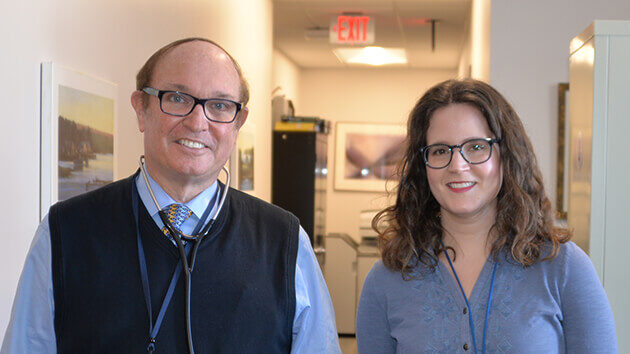Endocrinology Clinical Trials Program Thriving

Like many physicians in the Albany Med Health System, endocrinologist Robert Busch, MD, routinely conducts clinical trials. For more than two decades, that has involved testing new drugs to treat diabetes and complications from it, including heart disease, kidney disease and eye diseases.
“Being part of a clinical trial gives patients access to an innovative therapy that may be the future of medicine,” said Dr. Busch, who treats patients at the endocrinology clinic on Washington Avenue Extension in Albany.
At any time, there are more than 200 clinical trials underway at Albany Medical Center in just about every medical specialty, with others being conducted in Albany Med Health System hospitals.
Dr. Busch and his team often oversee more than a dozen of these studies at a time, all part of larger trials that enroll up to tens of thousands of people from the U.S. and around the world.
Each trial typically lasts about five years, though some may be as short as six months, explained Lauren Foster, a research coordinator.
The list of trials Dr. Busch has participated in is long, and includes many drugs that are now commonplace, including Vascepa, approved by the FDA in 2019 to reduce cardiovascular risk; Ozempic, approved in 2017 as a treatment for diabetes; and Repatha, approved in 2015 to treat certain patients with high cholesterol, and approved in 2017 to prevent heart attack and stroke.
“By the time we test a drug, it’s already been through Phase 1 and Phase 2 clinical trials that have shown it to be safe and effective,” said Dr. Busch. Phase 3 trials evaluate outcomes to determine whether the trial drug is better than other therapeutics that are already FDA approved and on the market.
Current trials being conducted by Dr. Busch and his team include:
- A long-term study evaluating the safety and efficacy of the drug Tirzepatide in participants whose Type 2 diabetes can’t be controlled by diet and exercise alone.
- A further trial of Ozempic studying renal outcomes in people who have Type 2 diabetes and a history of chronic kidney disease.
- A study examining whether Rybelsus, a medicine for Type 2 diabetes, has a positive effect on heart disease.
Future studies will examine a drug to treat diabetic neuropathy, an implantable glucose monitor that can measure glucose levels for six months, and a weekly insulin injection compared to a daily injection.
To inquire about participating in an upcoming endocrinology clinical trial, or to refer a patient as a possible participant, contact Dr. Busch at 518-489-4704.